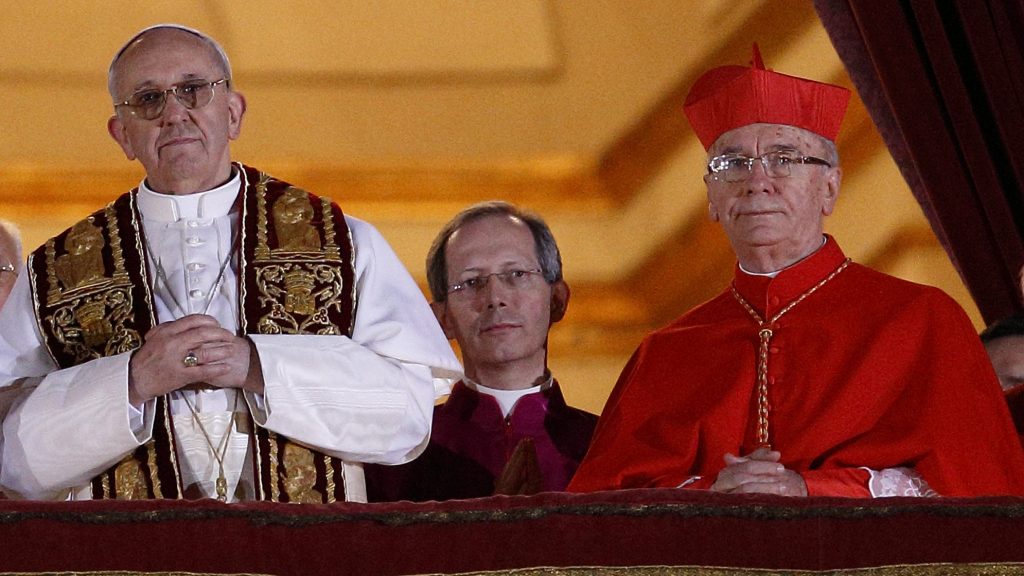ROME — By common consensus, Pope Francis is a reforming pope. Indeed, one could make the argument that the very first decision the new pontiff made, the one that introduced him to the world, signaled a dramatic reform course.
Recall the sequence when a new pope is elected. First, he has to accept election, which is the last choice he’ll ever make as anything less than the Vicar of Christ; then he has to pick a name, which is the symbolic opening move of the new papacy.
For centuries, many theologians and Church historians had maintained a short list of papal names that could never be used. There could never be a “Pope Jesus,” because no pontiff could arrogate to himself the name of the Savior, however common a name it might be in Spanish-speaking lands. There could also never again be a “Pope Peter,” since the first pope is in a class all by himself.
By a similar logic, many experts felt there could never be a “Pope Francis,” since the Poor Man of Assisi was such a singular and iconic figure in Church history, his name had to be forever restricted to his own memory.
All that changed in March 2013, when Jorge Mario Bergoglio of Argentina was elected to the papacy. The new pope would later recall in a session with the press that it was Cardinal Claudio Hummes of Brazil, a longtime fixture in Latin American Catholicism, who inspired his choice of name.
“When things started getting a little dangerous, he cheered me on,” the new pope said, referring to the conclave in which he was elected. “And when the vote came to two-thirds, the usual applause began, as the pope had been elected. He [Cardinal Hummes] hugged me, kissed me, and said: ‘Do not forget about the poor.’ Those words were carved on my mind.”
Thus, the Francis papacy was born.
It’s ironic that Cardinal Hummes, who did so much to inspire the vision of this papacy, including its particular concern for the Amazon region, died on Monday at the age of 87, just as the latest steps in Pope Francis’ ongoing reform campaign were being revealed.
In a recent interview with veteran Rome correspondent Phil Pullella of the Reuters news agency, Pope Francis said that he plans to name two women to the Vatican’s über-powerful Dicastery for Bishops, formerly the Congregation for Bishops, which is responsible for recommending new bishops to the pope around the world.
A good argument can be made that nothing any pope ever does is more important in terms of shaping the culture of the Catholic Church than the appointment of bishops, so by choosing who’ll recommend those names, a pope in effect is choosing whose instincts and preferences he trusts to set the tone for the Church for the next generation.
“I am open to giving (women) a chance,” Pope Francis said, after being asked by the news agency about his plans to further promote the role of women at the Vatican. “Two women will be appointed for the first time to the committee to choose bishops in the Congregation for Bishops,” he said.
“This way, things are opening up a bit,” the pope added.
Pope Francis didn’t identify which women he intends to appoint to the bishops’ panel, nor did he provide a sense of timing for when they might be in place. Still, for traditionalists who believe that such matters should pertain exclusively to clergy, it’s the latest papal pronouncement destined to engender heartburn.
To be clear, not everyone is ready to hail Pope Francis as the “Great Reformer,” in the phrase of his leading English-language biographer Austen Ivereigh.
Some Catholic feminists find Pope Francis’ steps so far toward empowering women — naming a woman, for example, as the No. 2 official in the Vatican City State, another as an official of the Synod for Bishops, and so on — to be half-measures, and remain frustrated that he hasn’t moved to ordain women as deacons, a measure recommended by the very Synod of Bishops for the Amazon that his good friend Cardinal Hummes did so much to encourage.
“How much longer should Catholic women be expected to be grateful at being offered crumbs from the table?” asked Kathleen Cummings, professor of American studies at the University of Notre Dame, in a July 6 statement.
In other areas, too, some object that Pope Francis’ reforms fall short of real change. From the left, one hears such objections about his openness to the LGBTQ+ community, which falls short of endorsing gay marriage; from the right, some grouse that the pope’s advocacy for the unborn doesn’t include Communion bans for pro-choice Catholic politicians.
Such complaints are baked into the cake for anyone in a position of leadership. One person’s “reform,” inevitably, is another’s failure or disappointment.
What no one can reasonably doubt, however, is that Pope Francis has remained true to the charge given by his friend Cardinal Hummes, not to forget the poor.
We got another reminder this week, when the Vatican confirmed that Pope Francis will travel to Assisi, his namesake’s home, for the sixth time on Sept. 24. The occasion will be the first in-person gathering of a new movement he helped launch called the “Economy of Francis,” which brings together young economists, businesspeople, academics, and other change agents desiring to build a new economy inspired by the vision of St. Francis of Assisi.
One prays that Hummes, whatever his own private catalog of frustrations and disappointments over the last nine years, nevertheless may rest in peace, knowing his legacy lives on in the papacy he helped name.

